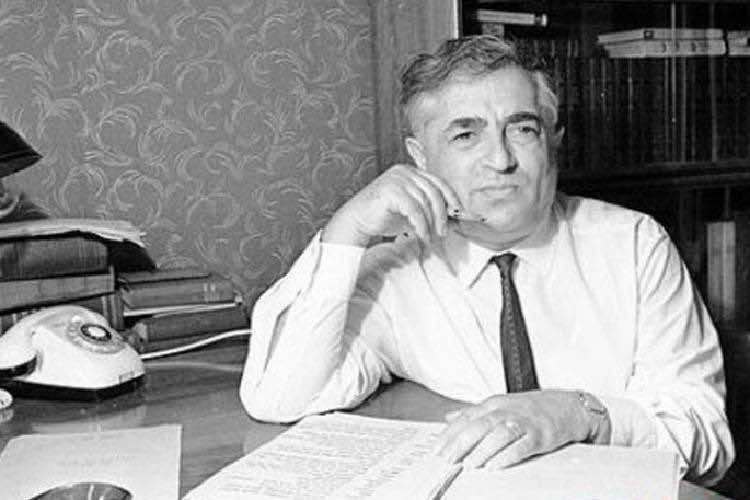Prominent prose writer and playwright Ilyas Afandiyev
 Ilyas Mahammad oghlu Afandiyev was born on May 28, 1914 in the city of Fuzuli. Ilyas Afandiyev's mother, Bilgeyis Khanum, played an invaluable role in his development as a young man. She instilled in him a love for books, literature, and reading. After her spouse’s death, she became her son’s teacher, friend, and father figure.
Ilyas Mahammad oghlu Afandiyev was born on May 28, 1914 in the city of Fuzuli. Ilyas Afandiyev's mother, Bilgeyis Khanum, played an invaluable role in his development as a young man. She instilled in him a love for books, literature, and reading. After her spouse’s death, she became her son’s teacher, friend, and father figure.
The future renowned writer developed a strong work ethic and a keen interest in reading from a young age. In 1921, Ilyas began his education in the first grade and graduated with excellent marks from a two-level secondary school focused on pedagogy in 1930. He enrolled in the Faculty of Literature at the Azerbaijan Pedagogical Institute named after V.I. Lenin in 1933 and completed the correspondence course at the Faculty of Geography in 1938. From the end of that year, Ilyas Afandiyev worked in the editorial offices of "Yeni Yol" ("New Way"), "Kommunist" ("Communist"), and "Ədəbiyyat qəzeti" ("Literary Newspaper") in Baku. His first published work, an essay titled "Buruqlar arasında" ("Among the Derricks"), was released in November 1938, while his first short story, "Berlində bir gecə" ("A Night in Berlin"), was published in the January 26, 1939 issue of "Ədəbiyyat qəzeti" ("Literary Newspaper").
Ilyas Afandiyev's book "Kənddən məktublar" ("Letters from the Village"), published in 1939, introduced him to readers.
In 1943, Ilyas Afandiyev co-wrote his first drama, "İntizar" ("Expectation"), alongside Mehdi Huseyn, thus laying the foundation for a creative partnership with the Azerbaijani National Theatre that would last over 50 years. By the late 1940s, he had already established himself as a novelist and playwright, with articles about his works published in the press.
Ilyas Afandiyev stands as one of the distinguished figures in 20th-century Azerbaijani literature, celebrated for his rich prose, which includes novels and stories such as "Söyüdlü arx" ("The Willow Ditch"), "Körpüsalanlar" ("Bridge Builders"), "Dağlar arxasında üç dost" ("Three Friends Behind the Mountains"), "Sarıköynəklə Valehin nağılı" ("The Tale of Sarikoynak and Valeh"), "Geriyə baxma, qoca" ("Don't Look Back, Old Man"), "Üçatılan" ("Shotgun") and others. His contributions to drama feature works like "İşıqlı yollar" ("Bright Paths"), "Bahar suları" ("Spring Waters"), "Atayevlər ailəsi" ("The Atayev Family"), "Sən həmişə mənimləsən" ("You Are Always With Me"), "Mənim günahım" ("My Fault"), "Unuda bilmirəm" ("I Can't Forget"), "Məhv olmuş gündəliklər" ("Destroyed Diaries"), "Qəribə oğlan" ("Strange Boy"), "Mahnı dağlarda qaldı" ("The Song Remained in the Mountains"), "Bağlardan gələn səs" ("A Voice from the Gardens"), and many more. His plays opened a new chapter in our theatrical art, establishing the "Ilyas Afandiyev Theater".
Azerbaijani theater poetry finds its artistic and aesthetic value primarily in the "Ilyas Afandiyev Theater". The playwright has become a literary embodiment of our nation’s struggle for national freedom and independence through his historical dramas such as "Mahnı dağlarda qaldı" ("The Song Remained in the Mountains"), "Xurşidbanu Natəvan" ("Khurshidbanu Natavan"), "Şeyx Məhəmməd Xiyabani" ("Sheikh Mahammad Khiyabani"), "Hökmdar və qızı" ("The Ruler and His Daughter"), and others. His works reflect the ideals of independence, the freedom movement, and national unity.
The distinguished writer, who has spent over sixty years in creative work, continued to write prolifically in the 1990s. He presented topics he could not address or write about during the Soviet regime and the era of party censorship in modern times. He published the story "Hacı Axundun cənnət bağı necə oldu" ("What Happened to Haji Akhund’s Garden of Paradise") and the novella "Xan qızı Gülsənubərlə tarzən Sadıqcanın nağılı" ("The Tale of the Khan's Daughter Gulsanubar and the Tar Player Sadigjan").
Additionally, he had his plays "Tənha iydə ağacı" ("The Lonely Elaeagnus Tree"), "Dəlilər və ağıllılar" ("The Madmen and the Sane"), "Hökmdar və qızı" ("The Ruler and His Daughter"), and others staged, while also releasing several new books.
In 1990, "Bizim qəribə taleyimiz" ("Our Strange Fate") and "Sevgililərin cəhənnəmdə vüsalı" ("The Reunion of Lovers in Hell") were successfully performed on the stages of Istanbul and Ankara, and the Turkish press published dozens of articles about these works.
The writer, who did not glorify the ruling ideology throughout his work, explored themes of South Azerbaijan and emigration, topics banned in literature at that time. He introduced the theme of emigration to literature with the play "The Lonely Elaeagnus Tree."
The theme of Karabakh holds a prominent place in the author's works. He closely monitored the treacheries and acts of aggression from our treacherous neighbors that began in the 1990s with profound concern and a sense of civic duty, reflecting the ancient history of Karabakh in his works.
Ilyas Afandiyev, who created most of his works during the Soviet era, skillfully depicted ordinary people's lives, love, hopes, and desires. As a result, his works continue to transcend geographical boundaries and have won the affection of new readerships.
The renowned writer Ilyas Afandiyev, who had a rich creative journey, passed away in Baku on October 3, 1996, and was buried in the Alley of Honor.
Recommended literature:
- İlyas Əfəndiyev 100: (məqalələr toplusu) /elmi red. Ş. Alışanlı. - Bakı: Elm, 2018. - 234 s.
- İlyas Əfəndiyev. Ömür davam edir: Ilyas Əfəndiyev haqqında xatirə kitabı /Azərb. Resp. Mədəniyyət və Turizm Naz.; tərt. ed., red. və ön söz müəl. Elçin. - Bakı: Təhsil, 2014. - 598 s.
- Xanoğlan, Vəfa. İlyas Əfəndiyev və Azərbaycan mədəniyyəti: [monoqrafiya] /V. Xanoğlan ; elmi red. A. Babayev. - Bakı: Elm, 2013. - 334 s.
- Seyidov, Yəhya Qasım oğlu. İlyas Əfəndiyev: həyatı və yaradıcılığı haqqında müxtəsər oçerk /Y. Q. Seyidov ; red. Z. Qiyasbəyli. - Bakı: Azərnəşr, 1975. - 234 s.